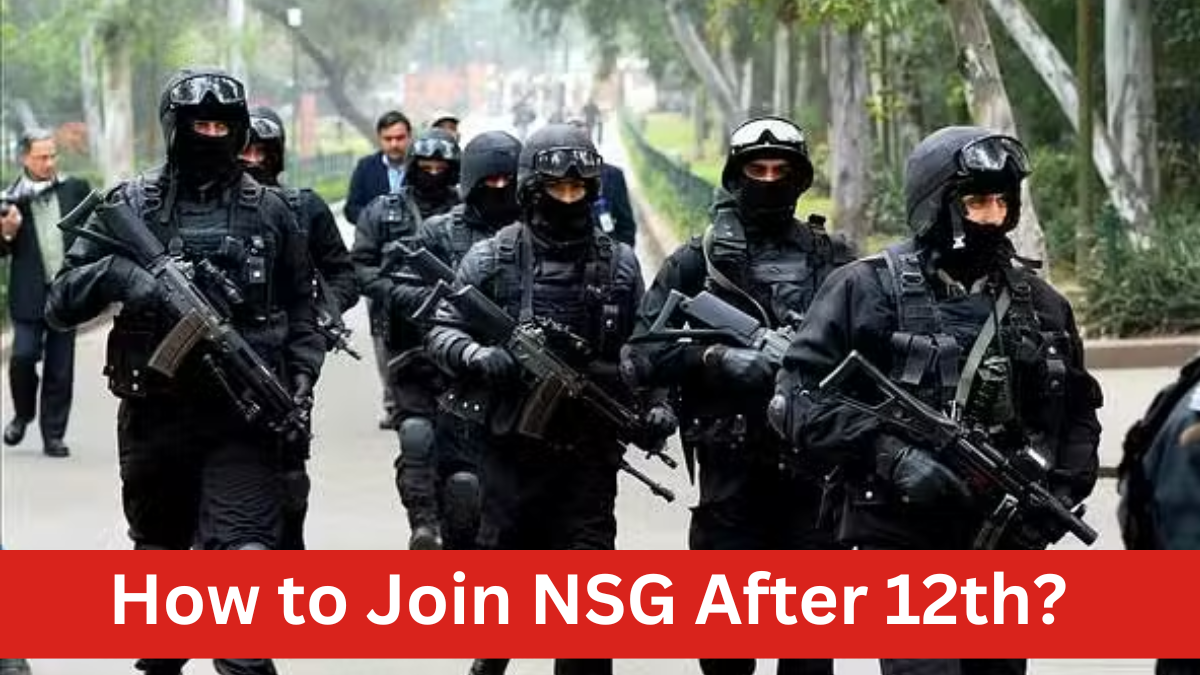Joining the National Security Guard (NSG) is a significant aspiration for many candidates aiming to serve in one of India’s elite forces. Understanding the process to join NSG is essential, as it is not as simple as other government recruitment exams. A clear understanding of the steps can help candidates plan their preparation effectively.
Unlike many other roles, there is no direct exam for NSG recruitment. Instead, a rigorous selection process is carried out, including physical fitness tests, psychological evaluations, and other assessments to identify the best candidates. The number of vacancies varies annually based on the force’s needs, making it crucial for aspirants to stay updated through the official NSG website.
How to Join NSG After 12th?
Many candidates wonder how to join the NSG after completing their 12th. Before understanding how to join the NSG, it’s important to note that the selection process is rigorous, but no specific entrance exams are conducted to choose candidates. The number of positions available in NSG units varies and depends on the overall quality of candidates in each batch (Indian armed forces). Entry into the NSG requires meeting certain eligibility criteria and successfully passing a multi-phase selection process. The selection involves rigorous physical, medical, and psychological assessments, followed by advanced training. Here’s a simplified overview of the NSG selection process:
Phase 1: Eligibility and Pre-Selection
Service Requirement: Candidates must have served at least 5 years in the police force or 3 years in the Indian Army.
Age Limit: Applicants should be under 35 years at the time of applying.
Standards: Candidates must meet the organization’s physical and medical requirements.
Examinations: Both physical and psychological evaluations are conducted to assess suitability for commando roles.
Clean Service Record: A spotless service record, free from any disciplinary issues, is mandatory.
Phase 2: Basic and Initial Training
Duration: Basic training lasts 14 months and is conducted at the NSG Training Centre in Manesar, Haryana.
Intensity: The training is highly demanding, with a dropout rate of 70-80% due to its difficulty level.
Next Step: Successful candidates proceed to advanced training after completing the basic course.
Phase 3: Advanced NSG Training
Skills Covered: Training includes areas like surveillance, intelligence gathering, infiltration techniques, unarmed and knife combat, bomb disposal, and advanced shooting methods.
Service Duration: Once trained, candidates serve in NSG units for 3-5 years.
For those aiming to join NSG after 12th, the path involves gaining experience in the police or armed forces, followed by fulfilling the eligibility and completing the selection process. The journey is challenging but rewarding for those who are committed and disciplined.
How to Join NSG: Eligibility Requirements
The National Security Guard (NSG) is a specialized unit known for handling high-risk operations like counter-terrorism and hostage rescues. Joining the NSG is a prestigious goal for many, but it requires meeting specific criteria. Here’s an overview of the important eligibility requirements:
Educational Qualification
To be eligible, candidates must hold a bachelor’s degree in any discipline from a recognized university. This academic foundation ensures that individuals have the necessary knowledge and skills to meet the demands of the role.
Citizenship
Only Indian citizens are eligible to apply, as the NSG is dedicated to safeguarding national security.
Service Experience
Candidates must already be serving in the armed forces or police departments. Those from the armed forces should have completed at least three years of service, while candidates from the police force must have a minimum of five years of experience. This ensures that candidates have prior training and practical exposure to disciplined environments.
Age Limit
Applicants must be under 35 years of age at the time of application. There are no age relaxations, regardless of category, to maintain the physical and mental standards required for the role.
Pathways to Eligibility
To qualify for NSG recruitment, individuals must first join the Indian Armed Forces or police. This can be achieved through competitive exams like the Combined Defence Services (CDS) or Central Armed Police Forces (CAPF) examinations conducted by UPSC, or through other state-level selection processes.
Meeting the eligibility criteria for the NSG is the first step toward joining this elite force. With a combination of academic qualifications, service experience, and strict age limits, the NSG ensures that only the best candidates are selected. Dedication, discipline, and preparation are key for those aspiring to serve in this prestigious unit.
Steps to Join NSG After 12th
The National Security Guard (NSG) is a top-tier government organization that specializes in handling high-risk situations such as counter-terrorism and VIP protection. Here’s how you can work toward becoming an NSG commando after completing 12th grade: To join NSG, you must first become part of the Indian Armed Forces or the Central Armed Police Forces (CAPF). This includes units like BSF, CRPF, CISF, and SSB. Candidates should aim to qualify through exams such as UPSC CDS or CAPF or join through state recruitment drives.
NSG Units and Their Roles
The National Security Guard (NSG) comprises specialized units designed to tackle high-risk operations, ensuring national security. Each unit has distinct responsibilities, ranging from counter-terrorism to VIP protection. These units include the Special Action Group (SAG), Special Composite Group (SCG).
Special Action Group (SAG)
Counter-Terrorism Operations: The SAG is deployed to neutralize terrorists during sieges, hostage situations, or attacks on critical infrastructure. Their expertise ensures minimal collateral damage and the safety of civilians.
Anti-Hijack Operations: In the event of hijackings, whether on land, sea, or air, the SAG is called to rescue hostages, regain control of the situation, and eliminate threats.
High-Risk Interventions: The SAG handles sensitive missions requiring rapid action, such as dismantling terrorist networks, conducting raids, and handling bomb threats.
Special Ranger Group (SRG)
The Special Ranger Group (SRG) is a crucial unit of the National Security Guard (NSG) dedicated to ensuring the security of VIPs and VVIPs across the country. This unit plays a vital role in safeguarding individuals holding critical positions in government and other high-profile domains. The SRG recruits personnel from diverse backgrounds, including state police forces, the armed forces, and Central Armed Police Forces (CAPF) units such as the Border Security Force (BSF), Indo-Tibetan Border Police (ITBP), and Central Industrial Security Force (CISF).
Special Composite Group (SCG)
This unit is tasked with managing counter-terrorism operations in urban areas. The SCG operates in key cities like Mumbai, Kolkata, Chennai, Hyderabad, and Gandhinagar.



 AOC Result 2025 Out, Download Link Activ...
AOC Result 2025 Out, Download Link Activ...
 CISF Constable Tradesmen Recruitment 202...
CISF Constable Tradesmen Recruitment 202...
 Top 10 Assault Rifles in the World, Know...
Top 10 Assault Rifles in the World, Know...





